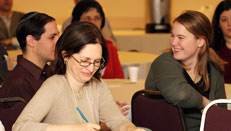 |
||||||||||||
| Who We Are | |
| Audience Accolades | |
| Contact Us | |
| Be a Volunteer | |
| Show Your Support | |
| Rabbi Jay Kelman | |
| Dr. Elliott Malamet | |
| Ilana Kelman | |
| News | |
| Our Speakers | |
| Our Partners | |
| Privacy Policy | |




Orthodox rabbis debate pros and cons of insularity
|
|
December 2, 2004 By FRANCES KRAFT Rabbi Nathan Lopes Cardozo says the haredi community's unwillingness to speak to Conservative and Reform Jews is "a big mistake." Not only does it give the impression of fearfulness, he believes, but he has found that he learns much from Reform and Conservative writings. Such critiques of the Orthodox perspective help him better formulate his own philosophy, he said at a recent symposium. The Dutch-born dean of the David Cardozo Academy in Jerusalem - who says he has a foot in both the haredi and the modern Orthodox worlds - was joined by three colleagues in a panel discussion on "The Future of Judaism," moderated by educator Elliott Malamet at the third annual Torah in Motion conference, "Renewing Our Spirit - Self, Family, Nation," held at Beth Jacob V'Anshei Drildz Congregation Nov. 7. Also participating on the panel were well-known modern Orthodox leader Rabbi Norman Lamm, chancellor of Yeshiva University and keynote speaker for the day; Rabbi Yosef Reinman, a haredi rabbi from Lakewood, N.J., who co-authored the controversial book One People, Two Worlds: A Reform Rabbi and an Orthodox Rabbi Explore the Issues That Divide Them; and Rabbi Pini Dunner, founding rabbi of London, England's Saatchi Synagogue, aimed at 25- to 45-year-olds. The day-long session attended by about 300 people - and the panel in particular - embodied one of Torah in Motion's underlying goals: not to be afraid to deal with controversial issues in an open manner, said Rabbi Jay Kelman, co-founder of the organization with his wife Ilana and with Malamet in 2002. Kicking off a lively exchange, Malamet asked panellists whether halachic Judaism has become too insular. Rabbi Reinman said that, with the publication of his book two years ago, he hoped he had exploded the myth about the inability of his community to "engage" other Jews. (The book notwithstanding, Rabbi Reinman cancelled a planned joint book tour following pressure from haredi leaders.) However, he noted, "the haredi world does not feel it's important as part of the chinuch [education] of our children to expose them to everything in the world, because you're taking a very high risk." Rabbi Dunner, whose family background is haredi, challenged Rabbi Reinman's contention that haredim are free to decide whether to explore the secular world as they get older. Rabbi Dunner said Rabbi Reinman's statement was "ideologically" correct, but that "practically speaking" there are very strong barriers to engaging with the secular world, extending to acceptance as part of the community and ability to find a marriage partner. Haredim are left at the mercy of the very people they want to avoid, by being "too cut off" from the modern world, Rabbi Lamm said. "The answer has to be nuanced." Every community has to protect young children, he said. "[But] I refuse to make a virtue out of ignorance, and I think it's important that we do. train young people coming into an age of maturity [regarding] who they are. and let them know how to grapple with the world." Rabbi Lopes Cardozo expressed similar sentiments, tempered by his agreement with Rabbi Reinman that North American haredi communities have more awareness of the outside world than their Israeli counterparts. Another problem, according to Rabbi Lopes Cardozo, is the haredi "obsession with Halachah for the sake of Halachah." He lamented an absence of haredi teaching of "the mission [of Judaism]," citing the notion of being a light unto the nations. "We have insulated ourselves so much that the non-Jewish world to a great extent no longer exists [for the haredi community]." In his experience, many yeshiva students do not know how to answer a non-religious Jew who asks why they are religious. At the same time, he said, in the modern Orthodox world, Halachah is not always taken seriously enough. "There's too much shopping going on, finding this rabbi for this heter [dispensation], that rabbi for that heter." Also, he noted, too many people call themselves modern Orthodox but have no idea what it means. Modern Orthodox writings are read by a very small number of people, he said. Regarding other denominations of Judaism, Rabbi Reinman said that to acknowledge his co-author as a rabbi would leave "the impression there are different streams of Judaism - different flavours of the same product - and it's not true." Rabbi Lamm said that while he doesn't recognize Reform rabbis as legitimate (in relation to Jewish law), he does recognize them as "valid" in terms of being leaders of a strong Jewish movement. Malamet challenged Rabbi Lamm as to whether he would appear on a panel with Jews for Jesus, because they are similarly "valid." In response to his answer - "No way!" - Rabbi Reinman said the difference between them was "where you draw the red line." "Some of your friends draw it closer, and keep me out too," quipped Rabbi Lamm. In answer to Malamet's final question - "If you had unlimited resources, what would you do to revive Judaism? - the rabbis had a variety of answers, including Rabbi Lamm's suggestion for a revamping of the Jewish education system, with free tuition from elementary school through graduate school, a doubling of teacher's salaries and firing about half the existing teachers. Reproduced with permission from The Canadian Jews News. |

 |
 |